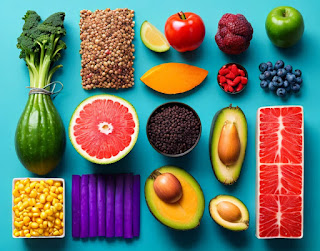The Ultimate Guide to Foods from Around the World
Author: Abdul Basit
Top 50 Super Healthy Foods for Optimal Health
Introduction
Eating a balanced diet rich in nutrients is essential for
maintaining good health. Here, we delve into 50 super healthy foods,
categorized by their benefits, to help you make the best choices for your diet.
Fruits
1. Blueberries
Benefits: High in antioxidants, vitamin C, and
fiber. Blueberries support brain health and reduce inflammation.
How to Use: Add to smoothies, oatmeal, or
salads.
2. Apples
Benefits: Rich in fiber and vitamin C. Apples
support heart health and aid digestion.
How to Use: Eat raw, bake into desserts, or
add to salads.
3. Oranges
Benefits: Excellent source of vitamin C,
potassium, and antioxidants. Oranges boost the immune system and improve skin
health.
How to Use: Eat raw, juice, or add to salads.
Vegetables
4. Spinach
Benefits: High in iron, calcium, and vitamins
A and K. Spinach promotes eye health and reduces oxidative stress.
How to Use: Add to smoothies, salads, or cook
as a side dish.
5. Kale
Benefits: Packed with vitamins A, C, and K, as
well as antioxidants. Kale supports heart health and has anti-inflammatory
properties.
How to Use: Use in salads, smoothies, or bake
into chips.
6. Broccoli
Benefits: Contains vitamins C and K, fiber,
and folate. Broccoli supports bone health and aids in detoxification.
How to Use: Steam, roast, or add to stir-fries.
Nuts and Seeds
7. Almonds
Benefits: High in healthy fats, fiber,
protein, magnesium, and vitamin E. Almonds promote heart health and weight
management.
How to Use: Snack on raw, add to salads, or
use almond butter.
8. Chia Seeds
Benefits: Rich in omega3 fatty acids, fiber,
and antioxidants. Chia seeds aid in digestion and improve heart health.
How to Use: Add to smoothies, yogurt, or make
chia pudding.
9. Walnuts
Benefits: Excellent source of omega3 fatty
acids, antioxidants, and vitamins. Walnuts support brain health and reduce
inflammation.
How to Use: Snack on raw, add to salads, or
bake into desserts.
Grains and Legumes
10. Quinoa
Benefits: High in protein, fiber, and
essential amino acids. Quinoa supports muscle health and provides sustained
energy.
How to Use: Cook as a side dish, add to
salads, or use in soups.
11. Lentils
Benefits: Packed with protein, fiber, and
iron. Lentils support digestive health and help regulate blood sugar levels.
How to Use: Add to soups, stews, or salads.
12. Brown Rice
Benefits: High in fiber, magnesium, and
selenium. Brown rice supports heart health and aids in weight management.
How to Use: Use as a side dish, in stir-fries,
or salads.
Proteins
13. Salmon
Benefits: Rich in omega3 fatty acids, protein,
and vitamin D. Salmon supports heart and brain health.
How to Use: Grill, bake, or add to salads.
14. Chicken Breast
Benefits: High in protein and low in fat.
Chicken breast supports muscle growth and weight management.
How to Use: Grill, bake, or add to salads and stir-fries.
15. Greek Yogurt
Benefits: High in protein, calcium, and
probiotics. Greek yogurt improves digestive health and supports bone health.
How to Use: Eat plain, add to smoothies, or
use as a base for dips.
Healthy Fats
16. Avocados
Benefits: High in healthy monounsaturated
fats, fiber, and potassium. Avocados support heart health and improve skin.
How to Use: Add to salads, smoothies, or make
guacamole.
17. Olive Oil
Benefits: Rich in monounsaturated fats and
antioxidants. Olive oil supports heart health and reduces inflammation.
How to Use: Use for cooking, in salad
dressings, or drizzling over dishes.
18. Coconut Oil
Benefits: Contains medium chain triglycerides
(MCTs) that provide quick energy and support brain health.
How to Use: Use for cooking, baking, or adding
to coffee.
Beverages
19. Green Tea
Benefits: High in antioxidants and catechins.
Green tea improves brain function and supports weight loss.
How to Use: Drink hot or cold, or add to
smoothies.
20. Kombucha
Benefits: Rich in probiotics and antioxidants.
Kombucha improves digestion and boosts the immune system.
How to Use: Drink as a refreshing beverage.
Spices and Herbs
21. Turmeric
Benefits: Contains curcumin, which has
powerful anti-inflammatory and antioxidant properties.
How to Use: Add to curries, smoothies, or make
golden milk.
22. Ginger
Benefits: Aids digestion, reduces nausea, and
has anti-inflammatory effects.
How to Use: Add to tea, smoothies, or use in
cooking.
23. Garlic
Benefits: Contains allicin, which has
antimicrobial and immune boosting properties.
How to Use: Add to savory dishes, soups, or
dressings.
Conclusion
Incorporating these super healthy foods into your diet can
significantly boost your overall health and wellbeing. Whether you’re looking
to improve heart health, support brain function, or simply enjoy a more
nutritious diet, these foods offer a variety of benefits that cater to
different health needs.
References
For more detailed information on super healthy foods, you
can refer to:



0 Comments